May 15, 2025 | 16:56 GMT +7
May 15, 2025 | 16:56 GMT +7
Hotline: 0913.378.918
May 15, 2025 | 16:56 GMT +7
Hotline: 0913.378.918
Mr. Nguyen Nhu Cuong, Director of the Department of Crop Production (Ministry of Agriculture and Rural Development), said that the Mekong Delta is the largest rice production granary in the country, accounting for more than 50% of total output and over 90% of the exported rice output of the entire country. However, this is also a region strongly affected by climate change. The clearest evidence is that saltwater intrusion occurred complicatedly in 2015–2016, 2019–2020, and most recently in the winter–spring crop of 2023–2024.
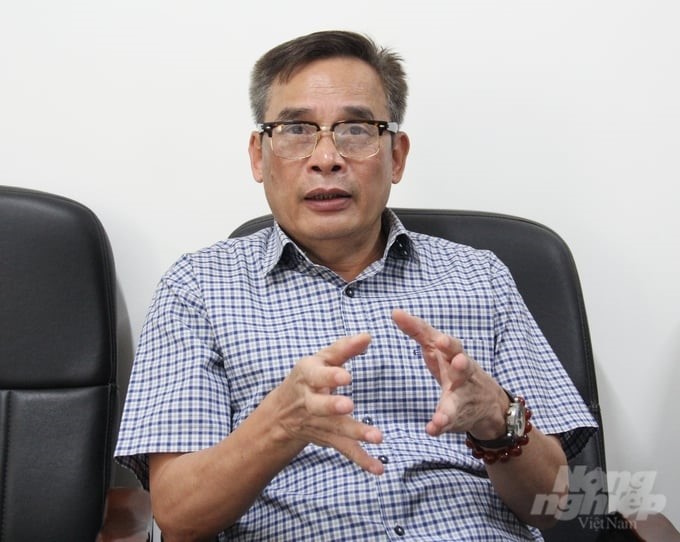
According to Mr. Nguyen Nhu Cuong, it is necessary to understand more thoroughly the goals that the 1 million hectares of high-quality rice project aims at. Photo: Trung Quan.
Another challenge for rice production in the Mekong Delta is that the small, household scale still accounts for a high proportion. The requirements of domestic and foreign markets are increasingly high in terms of product quality, food hygiene and safety, and environmental and social responsibility. In particular, studies and assessments show that rice production generates the largest amount of greenhouse gas emissions in the agricultural sector. A big question is how to fundamentally change the rice industry value chain in the Mekong Delta, thoroughly solving the problems and challenges being faced.
In that context, the project "Sustainable Development of 1 Million Hectares Specializing in High-Quality and Low-Emission Rice Cultivation Associated with Green Growth in the Mekong Delta Until 2030" (hereinafter abbreviated as the Project) is expected to bring optimal solutions to help increase production efficiency for farmers and sustainably develop the rice industry value chain in the Mekong Delta.
The most important goal of the Project is to form 1 million hectares specializing in high-quality and low-emission rice farming associated with reorganizing the production system along the value chain and applying sustainable farming processes to increase value and sustainably develop the rice industry; improve production and business efficiency as well as the income and lives of rice growers; protect the environment, adapt to climate change, and reduce greenhouse gas emissions, contributing to implementing Vietnam's international commitments.
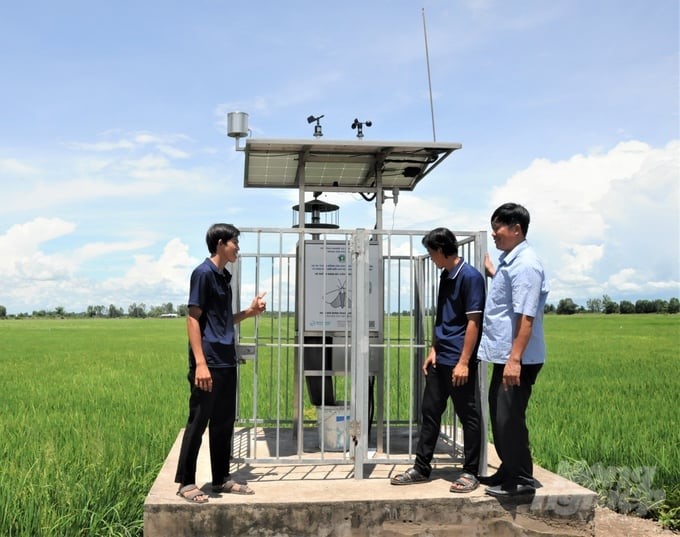
The first benefit of emission-reducing rice farming is that it helps reduce production costs and increase profits for farmers. Photo: VAN.
To do this, first of all, it is compulsory to reorganize production methodically and synchronously in the direction of organizing rice-growing households into cooperatives, cooperative groups, or farmers' organizations. Encourage businesses participating in the Project to sign linkage contracts with cooperatives and production households to provide quality inputs, technical support, and output consumption.
Along with that, form innovation centers and logistics centers associated with specialized farming areas, with the participation of cooperatives and businesses. At the same time, train and transfer to rice farmers and cooperatives sustainable farming methods such as straw treatment; knowledge of environmental protection and response to climate change; knowledge of management, business, market, digital transformation, etc.
Through building close linkage chains and strongly applying scientific and technical advances, large-scale, concentrated rice production areas will gradually be formed, creating uniformity in quality, reducing input costs, lowering production costs, and adapting to climate change.
According to Mr. Nguyen Nhu Cuong, the Project's key point is to enhance the application of technical solutions to achieve dual goals. The first goal of applying technical solutions such as "3 decrease 3 increase," "1 must 5 decrease," "alternate wetting and drying irrigation," etc., is to help farmers reduce input materials (fertilizers, seeds, water, etc.) to save costs and increase production value. At the same time, the issue of reducing greenhouse gas emissions is also raised.
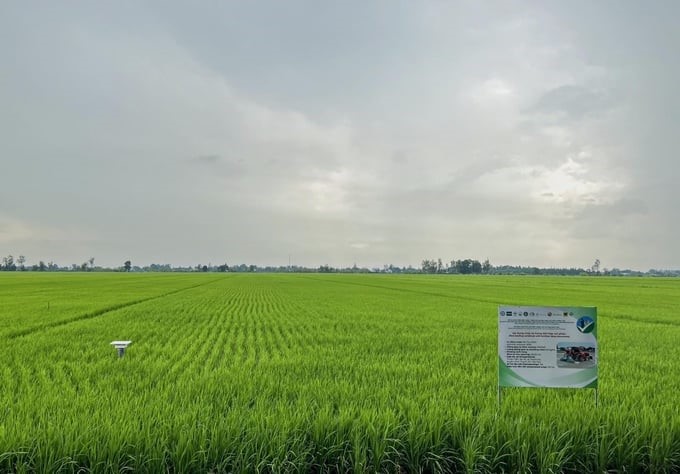
Applying advanced farming processes will help reduce input materials and increase economic efficiency for production households participating in the Project by about 15–20%, even 30%. Photo: Hong Binh Hieu.
Currently, many people do not understand the project thoroughly and assume that implementing it aims to receive and sell carbon credits with high value. We can do this, but that is a future story. Only when successfully and proficiently applying advanced rice farming solutions, especially the alternate wetting and drying irrigation technique, can emissions be reduced and revenue from trading on the carbon market be generated.
However, this is not a simple task, requiring a large enough farming scale. Farmers need to really change their awareness and traditional farming habits. It is also required to have a relatively complete irrigation system, with proactive irrigation; policy mechanisms to encourage farmers to apply science and technology; and operating costs for evaluation and monitoring systems.
If we calm down, we will easily see that applying advanced farming processes will help reduce input materials (fertilizers, seeds, water, etc.) maximally. When input materials decrease, it will immediately increase economic efficiency for production households participating in the Project by about 15–20%, even 30%. Along with improving economic efficiency, we will determine the level of emission reduction.
When the application of technical solutions becomes proficient and methodical and the level of emission reduction is determined, we can certify Vietnamese rice to reduce emissions. Since then, the image, brand, and value of Vietnamese rice will be enhanced, making it favorable to enter demanding markets with high requirements for responsible and sustainable farming, such as the US and Europe.
Mr. Nguyen Nhu Cuong emphasized that difficulties and bottlenecks in implementing the Project have been identified. Therefore, to ensure the achievement of set goals, the Ministry of Agriculture and Rural Development, the Department of Crop Production, and related units have quickly developed and promulgated mechanisms, policies, regulations, procedures, etc. to attract, guide, and mobilize all resources from the public sector, private sector, farmers, and cooperatives to actively participate in the Project.
It can be mentioned that the Ministry of Agriculture and Rural Development has issued a decision on guiding content to encourage organizations and individuals to participate in the Project. At the same time, deploy 7 pilot models in 5 Mekong Delta provinces (Can Tho, Kien Giang, Soc Trang, Tra Vinh, and Dong Thap) in 3 consecutive crops (summer-autumn of 2024 – autumn-winter of 2024 - winter-spring of 2024–2025, or autumn-winter of 2024 - winter-spring of 2024–2025 - summer-autumn of 2025). Of which, apply farming processes issued by the Department of Crop Production to reduce input materials, production costs, and emissions.
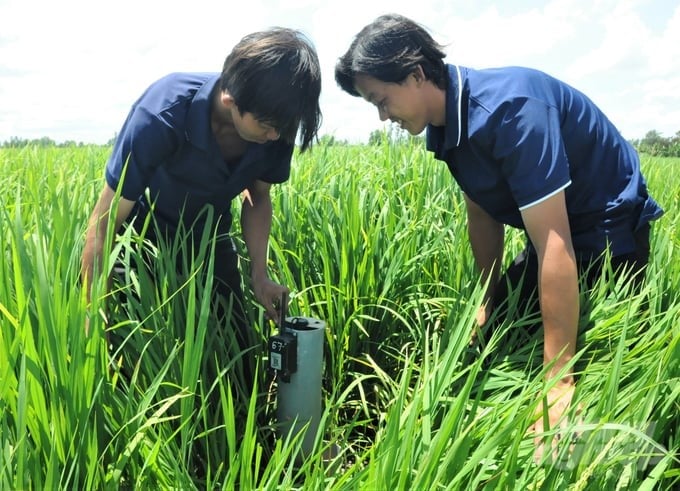
The Ministry of Agriculture and Rural Development and related units are actively implementing many solutions synchronously to achieve the goals set by the Project. Photo: Pham Hai.
The Department of Crop Production is also coordinating with the Institute for Agricultural Environment and localities to test the determination of the amount of greenhouse gases that we can reduce when applying advanced farming processes in specific conditions and for each different crop.
Besides, the Department of Crop Production, with the support of the International Rice Research Institute (IRRI) and domestic experts, is also developing a "Technical process for high-quality and low-emission rice production in the Mekong Delta" (1 million hectare process) to apply to production areas in the Project and issue an implementation manual. On the other hand, advise the Ministry of Agriculture and Rural Development to issue a decision to approve the plan for implementing measurement, reporting, and verification (MRV) at pilot models implementing the project.
According to many experts, the Project will be implemented until 2030; however, in addition to technical solutions, from now on, there needs to be a policy to create incentives to attract businesses to participate. Businesses must be the center and driver of implementing the Project as well as leading farmers to develop a sustainable rice industry value chain in the Mekong Delta.
Translated by Thu Huyen

(VAN) Data from 10,000 farming households will help professionalize production organization and support the implementation of the One Million Hectares Program for High-Quality, Low-Emission Rice Cultivation.

(VAN) FAO Director-General QU Dongyu marks International Day of Plant Health at NENA conference.

(VAN) Deputy Minister of Agriculture and Environment Hoang Trung affirmed that floriculture and ornamental plants are a growing industry that receives significant global attention.

(VAN) The three staple crops dominating modern diets – corn, rice and wheat – are familiar to Americans. However, fourth place is held by a dark horse: cassava.
/2025/05/10/4037-3-223011_495.jpg)
(VAN) Remote sensing technology is becoming an indispensable tool in monitoring resources, developing modern agriculture, and protecting the environment in Vietnam.
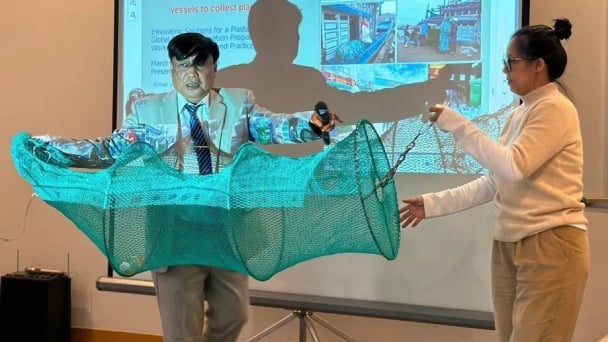
(VAN) The trash bag used on fishing vessels can withstand rough sea conditions, including level 8 to level 10 winds and waves. Notably, it can be hung anywhere on the boat.
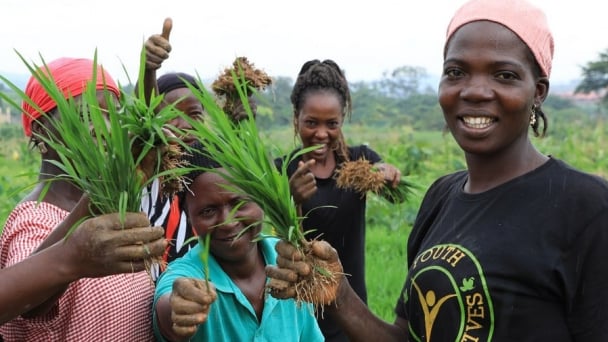
(VAN) African leaders launched the Kampala Declaration on Building Resilient and Sustainable Agrifood Systems in Africa, marking a bold step toward transforming the continent's agriculture.